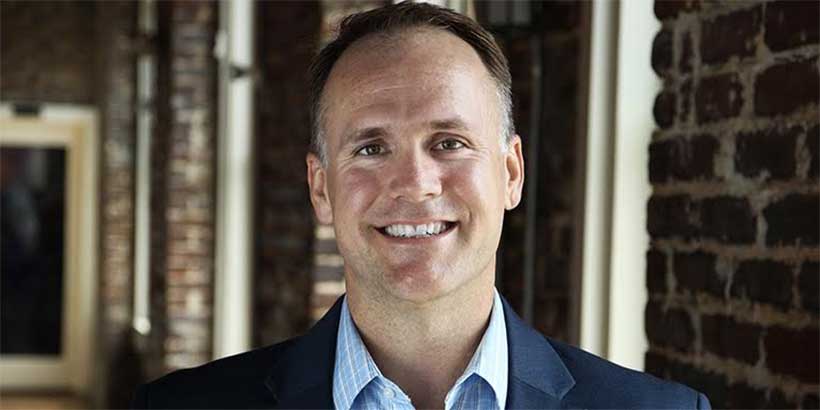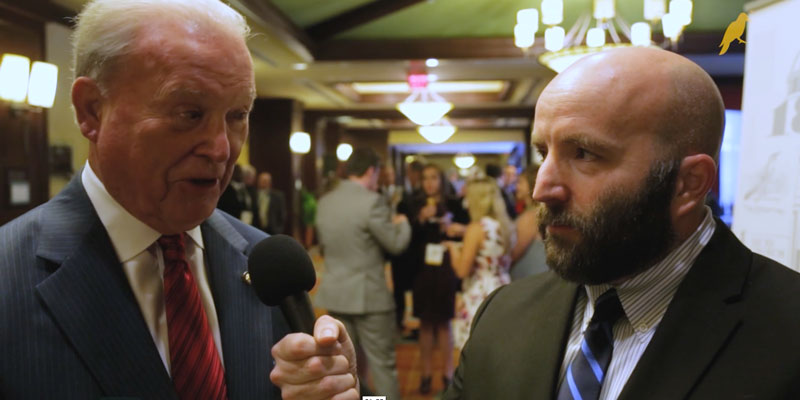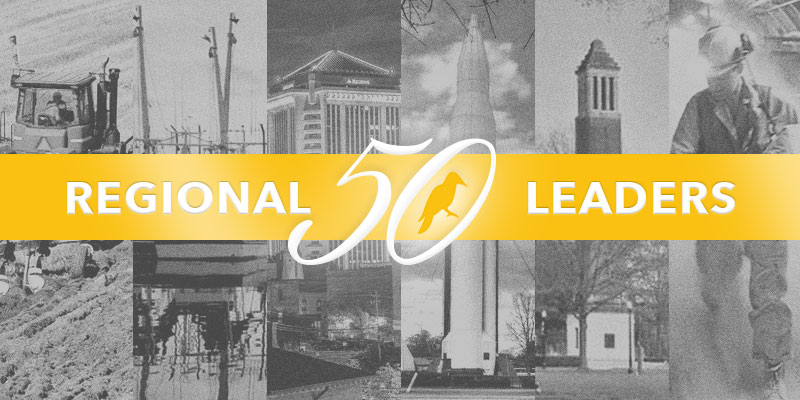Cord Sachs is a Birmingham-based leadership expert and the CEO of FireSeeds, a company that helps companies find and grow great leaders and “the company behind many of Alabama’s fastest growing companies.”
The full conversation with Mr. Sachs can be heard on the Yellowhammer Radio podcast or in the video above, and a lightly edited transcript of his interview with Yellowhammer’s Andrea Tice and Scott Chambers can be read below.
Subscribe to the Yellowhammer Radio Podcast on iTunes. Learn more about Cord Sachs and Fireseeds at www.fireseeds.com
Andrea Tice:
Hey, welcome back. Welcome back to Yellowhammer Radio. You’re listening to us on Superstation 101.1 WYDE. Andrea Tice in here, Scott chambers is on his way back and right now i’m sitting at the table with one Mr. Cord Sachs. I just want to make sure I got that name right.
Cord Sachs:
It’s been pronounced many many ways.
Andrea Tice:
So Cord Sachs is here with us and he represents Fireseeds and we got to talking on a topic last week that we need to finish. I’m gonna let Scott jump in.
Scott Chambers:
Cord, I appreciate you being here with us. I apologize apparently the break was a little bit shorter than I was anticipating.
Cord Sachs:
Not a problem Scott.
Scott Chambers:
When you drink so much water when you’re on the air you know you have to take little breaks to the talk show host room occasionally and and that took about a minute longer than i expected. I do apologize sir. I’m not so thrilled that you are with us Cord Sachs of course with Fireseeds. You’re gonna be joining us each and every Wednesday and we’ve been talking about that we can help your life from the family room to the boardroom or the boardroom to the family room. And all of that is intermingled with each other. What happens at home can affect your work life and what happens at work can affect your home life as well. You guys at Fireseeds really help those two come together right?
Cord Sachs:
Yeah that’s right. We really focus on culture and culture is everywhere. Culture’s at work culture’s at home and the whole idea here is that you can leave a legacy at home while that also being your advantage at work. So boardroom to family room is the topic and the metaphor that were using to see how we appropriately combine the two to get our greatest motivation.
Scott Chambers:
Very nice.
Andrea Tice:
One of the things you said last week I remember, Cord, was that the normal conventional idea that certain external motivations work in the workplace. You’re saying toss that out.
Cord Sachs:
That’s right. Daniel Pink says that external motivators just don’t work. The carrots and the sticks at work, the opportunity for more pay, more promotion those can be goals but they can’t be your motivators. Goals are in results, motivation has to come from somewhere else and I’m making the argument here that it’s got to come from the family room outside of work.
Andrea Tice:
Ok, so that’s when this acronym comes up that we talked about right? AMP? There’s three aspects to it. We got started on one the “A” which is “autonomy” but there’s others. There’s two others “mastery” and “purpose”. So let’s just start from the “A” and take it through.
Cord Sachs:
Autonomy it is our freedom. Think about your freedom, your ability to control the aspects of your life that add meaning. So it’s your that’s your “autonomy”. You’ve got “mastery”, think about “mastery” as growth. Growth in the areas of life that make you a more meaningful version of yourself. So the times in your life, the people in your life, events in your life that have helped you grow are areas of mastery and they motivated you in a way that you can’t get otherwise. Then finally “purpose”. If “autonomy” is freedom and “mastery” is growth then “purpose” is impact. It’s the impact you have on meaningful things outside of yourself. So Daniel Pink says that these are the three core intrinsic motivators that actually drive our productivity at work at work.
Andrea Tice:
At work and at home.
Cord Sachs:
Absolutely.
Scott Chambers:
Well you talk about autonomy, mastery and purpose. Can you unpack autonomy, mastery and purpose for us?
Cord Sachs:
Yes, so again think about autonomy, it’s where you have the freedom to control meaningful things of your life. That’s usually not at work it’s the more defined domain where you don’t have the opportunity to define your job description or your goal is usually set for you. And so it’s the same thing with with mastery. You you have the autonomy a lot of the time to grow in the areas that you want to grow in most at home not at work. And in the end the day purpose, there are more and more organizations I think that are cluing in that we really need to have a purpose driven culture but if they don’t we’re not going to get that at work primarily we have to look at home. We have to look at the family room if you will, things outside of work to drive us so that we ultimately get better results at work.
Scott Chambers:
Fascinating, our guest is Cord Sachs with Fireseeds and this is really fascinating.I want to know something Cord, how can we motivate ourselves at work because a lot of people struggle with this. I mean this is what a lot of people do struggle with, being motivated at work.
Cord Sachs:
Right, in fact I was just downtown meeting with a client, Iron Tribe Fitness, and we were talking about how redefining, re-profiling what is an ideal leader. An ideal manager, coach for Iron Tribe. And the number one thing they say is we’ve got to find drive. We want to find driven folks that we don’t have to hold their hands, their self motivated. There’s an intrinsic drive that we don’t have to provide in the workplace and those are the ones that work best for us.Hands down the number one trait that employers are looking to find is that this drive this the self-motivation, this initiative. Probably why most people get promoted as well because they’ve been known as the person that has this.
Andrea Tice:
Now, is it possible if someone’s not exhibiting drive that you can kind of cultivate that out of them? Is that something you can kind of weed through and and figure out and bring them to the forefront?
Cord Sachs:
That’s this mystical question that we’re trying to trying to solve. Where do we find that motivation and so that’s the whole idea here is you won’t find it at work you won’t find it by setting clear goals. Goals are end results but motivational driving factors have to come from the areas of your life that actually mean something intrinsically to you and guess what that’s typically found in the family room in the life outside of work. We want to try to build, we want to bring in some of that outside motivational drive into the workforce.
Scott Chambers:
What’s the best way to bring in some of that outside drive and motivation into the workforce. How can you put those two together? What is the best way to do that?
Cord Sachs:
Alright, very pragmatically we would say build a vision board.
Scott Chambers:
For those who that don’t know, what is a vision board?
Cord Sachs:
Very good. Think vision, think sight. It’s the ability to see images of the things that add meaning to our life on a regular basis put in front of us. Remind us of why we are there, who we are and and why we’re working so hard at work. So building a vision board it’s not just a warm fuzzy. There’s a the company called Southwestern Consulting and they consult with a sales executives all over the world. Since 1855 was when they were founded. So a lot of credibility here they’ve done it for a few minutes and the very first thing they do with high-power executive sales reps is they have them build a vision board. It’s crazy but they’re going to produce better sales results if they have a board in front of them at work that reminds them of all the things that have meaning in their lives and guess what is usually on this board? All of the things that are home. Your family, the things that matter to them, the people that have impacted them. So yeah, creating a vision board something very practical you can do to fuel this channel of intrinsic motivation.
Andrea Tice:
So it’s as simple as essentially a bulletin board that you have at school or at home where you stick up notes but this is different in that their purposeful things. Pictures, notes.
Cord Sachs:
Absolutely, it’s not rocket science. There’s no. Going back to AMP, what are the the areas of my life that I have freedom to do that I really enjoy that are meaningful to me outside of work and I’m going to put pictures of those on this board.
Andrea Tice:
Alright, so Cord I can only assume that you have a vision board yourself?
Cord Sachs:
I do.
Andrea Tice:
Can you share with us some of what’s on there because I just want to get an idea where this goes.
Cord Sachs:
Absolutely and so as I was building my vision board one of the first things we do with anybody that comes to work for Fireseeds is they are going to build a vision board. And what they’re gonna do is they’re going to think through first of all the people in their lives that have been impacted the most and think past present and future. So in the past you know one of the individuals that have greatly impacted my life is my dad. He died 10 years ago but my hero in life had a huge impact on me. Of course I’m going to have him on this board as a reminder of all the ways he’s impacted me he helped me in my own freedom as a leader in my own mastery of certain things. He really define the purpose for my life so a big motivational figure in my life is my dad so he obviously is on this on this vision board. Then I think of the past, my wife’s grandmother 97 years old she’s still alive but was a switchboard operator World War II. Just one of those ladies that was a pistol and has more excitement and enthusiasm in her. Every time we go see her we walk away encouraged. We walk away motivated and so she’s on my board. If you think through the past people in your life that have impacted you, the present people obviously most people would have their family I would hope on this board, and then the future version of the people that matter most. Think about those pictures and those images. I have a picture of a college right next to my kids because that’s a goal I have, a dream I have. I’ve got six of them and some of them may be a good fit to go to college. So that’s all my vision board.
Scott Chambers:
Those are perfect motivators that you mentioned there you know because that’s on your vision board. Your father, your grandmother those are things that motivate you and you know we say from the family room to the boardroom but this necessarily doesn’t have to be even in the boardroom. This could be in all aspects in every type of career path right?
Cord Sachs:
Absolutely, it could be in the locker room, write in the vision board why I’m working as hard as I am and we remind ourselves on a regular basis of the things that matter most and scientifically the social sciences say that’s where our drive comes from. Its when we’re disconnected from the things that mean the most to us when we begin to shut down and lose motivation and therefore lose our impact.
Scott Chambers:
Cord Sachs, that is amazing. That can definitely help anyone no matter if you’re in a boardroom or you are working in a recycling factory or maybe you’re delivering pizzas. You need that motivation, that’s your drive you need that motivation not only to prosper in your job and your family life as well. And that’s what you guys do with Fireseeds to help people out. If you don’t mind, tell people how they can get in touch with Fireseeds, learn more about what is the Cord Sachs and Fireseeds does.
Cord Sachs:
You can go to Fireseeds.com, you can learn about how we recruit multiplying leaders for purpose-driven companies and then we also have strategy around leader development to help them grow.
Scott Chambers:
Fantastic. Cord Sachs, thanks for being with us and we look forward to talking to you again next Wednesday.













